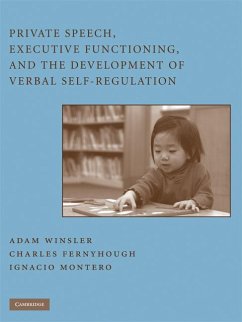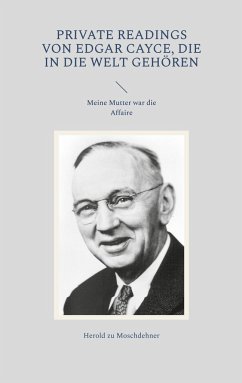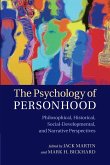Private Speech, Executive Functioning, and the Development of Verbal Self-Regulation
Herausgeber: Winsler, Adam; Montero, Ignacio; Fernyhough, Charles
Private Speech, Executive Functioning, and the Development of Verbal Self-Regulation
Herausgeber: Winsler, Adam; Montero, Ignacio; Fernyhough, Charles
- Gebundenes Buch
- Merkliste
- Auf die Merkliste
- Bewerten Bewerten
- Teilen
- Produkt teilen
- Produkterinnerung
- Produkterinnerung
This text will be an essential volume for those interested in the interface between language, cognition, and behavior.
Andere Kunden interessierten sich auch für
![Self-Regulation Theory Self-Regulation Theory]() Dennis E. MithaugSelf-Regulation Theory105,99 €
Dennis E. MithaugSelf-Regulation Theory105,99 €![Private Readings von Edgar Cayce, die in die Welt gehören Private Readings von Edgar Cayce, die in die Welt gehören]() Herold zu MoschdehnerPrivate Readings von Edgar Cayce, die in die Welt gehören19,99 €
Herold zu MoschdehnerPrivate Readings von Edgar Cayce, die in die Welt gehören19,99 €![Die verborgene Ordnung des Weltsystems Die verborgene Ordnung des Weltsystems]() Raoul Heinrich FrancéDie verborgene Ordnung des Weltsystems10,99 €
Raoul Heinrich FrancéDie verborgene Ordnung des Weltsystems10,99 €![Constructing the Self in a Digital World Constructing the Self in a Digital World]() Constructing the Self in a Digital World99,99 €
Constructing the Self in a Digital World99,99 €![The Psychology of Personhood The Psychology of Personhood]() The Psychology of Personhood45,99 €
The Psychology of Personhood45,99 €![The Cambridge Handbook of Personality Psychology The Cambridge Handbook of Personality Psychology]() The Cambridge Handbook of Personality Psychology192,99 €
The Cambridge Handbook of Personality Psychology192,99 €![The Diversity of Human Relationships The Diversity of Human Relationships]() The Diversity of Human Relationships135,99 €
The Diversity of Human Relationships135,99 €-
-
-
This text will be an essential volume for those interested in the interface between language, cognition, and behavior.
Hinweis: Dieser Artikel kann nur an eine deutsche Lieferadresse ausgeliefert werden.
Hinweis: Dieser Artikel kann nur an eine deutsche Lieferadresse ausgeliefert werden.
Produktdetails
- Produktdetails
- Verlag: Cambridge University Press
- Seitenzahl: 272
- Erscheinungstermin: 1. Juni 2009
- Englisch
- Abmessung: 286mm x 221mm x 19mm
- Gewicht: 952g
- ISBN-13: 9780521866071
- ISBN-10: 0521866073
- Artikelnr.: 26104736
- Herstellerkennzeichnung
- Libri GmbH
- Europaallee 1
- 36244 Bad Hersfeld
- gpsr@libri.de
- Verlag: Cambridge University Press
- Seitenzahl: 272
- Erscheinungstermin: 1. Juni 2009
- Englisch
- Abmessung: 286mm x 221mm x 19mm
- Gewicht: 952g
- ISBN-13: 9780521866071
- ISBN-10: 0521866073
- Artikelnr.: 26104736
- Herstellerkennzeichnung
- Libri GmbH
- Europaallee 1
- 36244 Bad Hersfeld
- gpsr@libri.de
Preface Laura Berk; Introduction/Overview Adam Winsler, Charles Fernyhough
and Ignacio Montero; Part I. Overview, Theoretical, and Biological
Foundations: 1. Still talking to ourselves after all these years: a review
of current research on private speech Adam Winsler; 2. Dialogic thinking
Charles Fernyhough; 3. The executive functions of language in preschool
children Ulrich Müller, Sophie Jaques, Karin Brocki and Philip David
Zelazo; 4. The neuropsychology of covert and overt speech: implications for
the study of private speech in children and adults Simon Jones; Part II.
Language, Communication, Social Cognition and Awareness: 5. Talking and
thinking: the role of speech in social understanding Jeremy Carpendale,
Charles Lewis, Noah Susswein and Joanna Lunn; 6. Private speech and theory
of mind: evidence for developing functional relations Charles Fernyhough
and Elizabeth Meins; 7. Development of communicative competence through
private and inner speech Peter Feigenbaum; 8. Private speech in the
framework of referential communication Conchi San Martín Martinez, Humbert
Boada and Maria Forns Santacana; 9. Preschool children's awareness and
theory of speech Louis Manfra; 10. Younger children's knowledge about overt
and covert private speech John Flavell and Adrian A. Wong; Part III.
Symbols and Tools Throughout the Lifespan: 11. Private pointing and private
speech: development of executive function Begoña Delgado, Juan Carolos
Gómez and Encarnación Sarriá; 12. Symbols as tools in the development of
executive function Stephanie Carlson and Danielle M. Beck; 13. On the
persistence of private speech: empirical and theoretical considerations
Robert M. Duncan and Donato Tartulli; 14. Private speech beyond childhood:
testing the developmental hypothesis José Sánchez-Medina, David Alarcón
Rubio and Manuel de la Mata; Part IV. Motivational and Educational
Applications: 15. Private speech and motivation: the role of language in a
sociocultural account of motivational processes David J. Atencio and
Ignacio Montero; 16. Creativity and private speech in young children C.
Stephen White and Martha Daugherty; 17. Early childhood teacher's
awareness, beliefs, and practices toward children's private speech Carla
Deniz; Afterword James Wertsch.
and Ignacio Montero; Part I. Overview, Theoretical, and Biological
Foundations: 1. Still talking to ourselves after all these years: a review
of current research on private speech Adam Winsler; 2. Dialogic thinking
Charles Fernyhough; 3. The executive functions of language in preschool
children Ulrich Müller, Sophie Jaques, Karin Brocki and Philip David
Zelazo; 4. The neuropsychology of covert and overt speech: implications for
the study of private speech in children and adults Simon Jones; Part II.
Language, Communication, Social Cognition and Awareness: 5. Talking and
thinking: the role of speech in social understanding Jeremy Carpendale,
Charles Lewis, Noah Susswein and Joanna Lunn; 6. Private speech and theory
of mind: evidence for developing functional relations Charles Fernyhough
and Elizabeth Meins; 7. Development of communicative competence through
private and inner speech Peter Feigenbaum; 8. Private speech in the
framework of referential communication Conchi San Martín Martinez, Humbert
Boada and Maria Forns Santacana; 9. Preschool children's awareness and
theory of speech Louis Manfra; 10. Younger children's knowledge about overt
and covert private speech John Flavell and Adrian A. Wong; Part III.
Symbols and Tools Throughout the Lifespan: 11. Private pointing and private
speech: development of executive function Begoña Delgado, Juan Carolos
Gómez and Encarnación Sarriá; 12. Symbols as tools in the development of
executive function Stephanie Carlson and Danielle M. Beck; 13. On the
persistence of private speech: empirical and theoretical considerations
Robert M. Duncan and Donato Tartulli; 14. Private speech beyond childhood:
testing the developmental hypothesis José Sánchez-Medina, David Alarcón
Rubio and Manuel de la Mata; Part IV. Motivational and Educational
Applications: 15. Private speech and motivation: the role of language in a
sociocultural account of motivational processes David J. Atencio and
Ignacio Montero; 16. Creativity and private speech in young children C.
Stephen White and Martha Daugherty; 17. Early childhood teacher's
awareness, beliefs, and practices toward children's private speech Carla
Deniz; Afterword James Wertsch.
Preface Laura Berk; Introduction/Overview Adam Winsler, Charles Fernyhough
and Ignacio Montero; Part I. Overview, Theoretical, and Biological
Foundations: 1. Still talking to ourselves after all these years: a review
of current research on private speech Adam Winsler; 2. Dialogic thinking
Charles Fernyhough; 3. The executive functions of language in preschool
children Ulrich Müller, Sophie Jaques, Karin Brocki and Philip David
Zelazo; 4. The neuropsychology of covert and overt speech: implications for
the study of private speech in children and adults Simon Jones; Part II.
Language, Communication, Social Cognition and Awareness: 5. Talking and
thinking: the role of speech in social understanding Jeremy Carpendale,
Charles Lewis, Noah Susswein and Joanna Lunn; 6. Private speech and theory
of mind: evidence for developing functional relations Charles Fernyhough
and Elizabeth Meins; 7. Development of communicative competence through
private and inner speech Peter Feigenbaum; 8. Private speech in the
framework of referential communication Conchi San Martín Martinez, Humbert
Boada and Maria Forns Santacana; 9. Preschool children's awareness and
theory of speech Louis Manfra; 10. Younger children's knowledge about overt
and covert private speech John Flavell and Adrian A. Wong; Part III.
Symbols and Tools Throughout the Lifespan: 11. Private pointing and private
speech: development of executive function Begoña Delgado, Juan Carolos
Gómez and Encarnación Sarriá; 12. Symbols as tools in the development of
executive function Stephanie Carlson and Danielle M. Beck; 13. On the
persistence of private speech: empirical and theoretical considerations
Robert M. Duncan and Donato Tartulli; 14. Private speech beyond childhood:
testing the developmental hypothesis José Sánchez-Medina, David Alarcón
Rubio and Manuel de la Mata; Part IV. Motivational and Educational
Applications: 15. Private speech and motivation: the role of language in a
sociocultural account of motivational processes David J. Atencio and
Ignacio Montero; 16. Creativity and private speech in young children C.
Stephen White and Martha Daugherty; 17. Early childhood teacher's
awareness, beliefs, and practices toward children's private speech Carla
Deniz; Afterword James Wertsch.
and Ignacio Montero; Part I. Overview, Theoretical, and Biological
Foundations: 1. Still talking to ourselves after all these years: a review
of current research on private speech Adam Winsler; 2. Dialogic thinking
Charles Fernyhough; 3. The executive functions of language in preschool
children Ulrich Müller, Sophie Jaques, Karin Brocki and Philip David
Zelazo; 4. The neuropsychology of covert and overt speech: implications for
the study of private speech in children and adults Simon Jones; Part II.
Language, Communication, Social Cognition and Awareness: 5. Talking and
thinking: the role of speech in social understanding Jeremy Carpendale,
Charles Lewis, Noah Susswein and Joanna Lunn; 6. Private speech and theory
of mind: evidence for developing functional relations Charles Fernyhough
and Elizabeth Meins; 7. Development of communicative competence through
private and inner speech Peter Feigenbaum; 8. Private speech in the
framework of referential communication Conchi San Martín Martinez, Humbert
Boada and Maria Forns Santacana; 9. Preschool children's awareness and
theory of speech Louis Manfra; 10. Younger children's knowledge about overt
and covert private speech John Flavell and Adrian A. Wong; Part III.
Symbols and Tools Throughout the Lifespan: 11. Private pointing and private
speech: development of executive function Begoña Delgado, Juan Carolos
Gómez and Encarnación Sarriá; 12. Symbols as tools in the development of
executive function Stephanie Carlson and Danielle M. Beck; 13. On the
persistence of private speech: empirical and theoretical considerations
Robert M. Duncan and Donato Tartulli; 14. Private speech beyond childhood:
testing the developmental hypothesis José Sánchez-Medina, David Alarcón
Rubio and Manuel de la Mata; Part IV. Motivational and Educational
Applications: 15. Private speech and motivation: the role of language in a
sociocultural account of motivational processes David J. Atencio and
Ignacio Montero; 16. Creativity and private speech in young children C.
Stephen White and Martha Daugherty; 17. Early childhood teacher's
awareness, beliefs, and practices toward children's private speech Carla
Deniz; Afterword James Wertsch.








